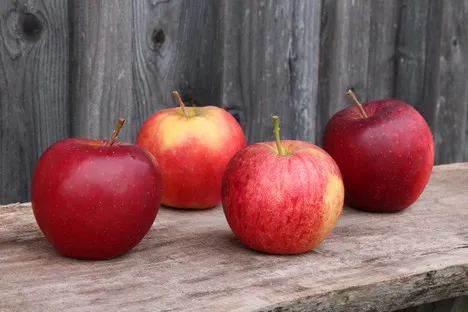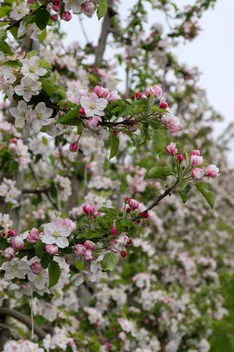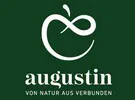The German pome fruit season is currently in its final phase, and the same applies to the marketing of domestic organic apples. "The last stocks of Elstar and Topaz have already been marketed, Natyra will probably be available until the end of June. The marketing of the Jonagold group - Jonagored, Red Jonaprince and Marnica - will be finished by the end of July, so a totally seamless shift to the new apple crop will not be possible for us," says Hinrich Quast, sales manager of Bio-Augustin & Co, based in Jork.
The company, based in the heart of the Alte Land, the northern German apple-growing region just outside Hamburg, has been dedicated to the procurement, preparation, packaging and marketing of organic apples, exclusively from Germany, for three decades. Quast: "Most regional apple varieties are now coming into bloom. The weather has been right so far. We have managed the frosty nights with frost protection irrigation, and when the drought persisted, the water applied benefited the crops. We therefore expect a good harvest," Quast comments.

Hinrich Quast is responsible for sales at Bio-Augustin Ltd & Co.
He says that marketing of last year's harvest has been satisfactory so far. Quast: "Purchasing power is weakening a bit in the wake of the pandemic, and this is reflected in the sales. The key question this year, however, will be how sales will develop as production costs tend to rise - electricity, diesel and minimum wage increases - not only within cultivation but also in processing and packaging."

Fresh organic apples from the Jonagold Group.
Freya and Deichperle-Bio
In the longer term, the northern German company's sophisticated range of varieties will be continuously optimized in close cooperation with regional growers. "Topaz has now become the second best-selling organic apple after Elstar, while Wellant and Natyra also enjoy an increasing popularity. Santana is developing very differently in terms of demand; this year, for example, sales have been somewhat subdued. New registrations include the scab-resistant varieties Freya and Deichperle-Bio, which will reach full yield in a few years."
northern German company's sophisticated range of varieties will be continuously optimized in close cooperation with regional growers. "Topaz has now become the second best-selling organic apple after Elstar, while Wellant and Natyra also enjoy an increasing popularity. Santana is developing very differently in terms of demand; this year, for example, sales have been somewhat subdued. New registrations include the scab-resistant varieties Freya and Deichperle-Bio, which will reach full yield in a few years."
Right: Apple blossom in the Alte Land
In general, there has been increased demand for regional organic pome fruit, says Quast. To meet the increasing demand in the future, the company will move into a new headquarters with state-of-the-art processing and packaging technology in the fall. "With this capacity expansion, we are repositioning ourselves for the future, increasing our clout."
Apricots from protected cultivation
In times of climate change, there are also new opportunities for fruit farms in the Alte Land, Quast concludes. "Regional stone fruit from protected cultivation is a topic with potential for expansion. One of our growers has been involved in apricot cultivation for several years and the results are promising."
For more information:
Hinrich Quast
Bio-Obst Augustin GmbH & Co. KG
Klein Hove 21
21635 Jork
T +49 (0) 4162-9 00 18-0
hq@bioaugustin.de
www.bioaugustin.de
